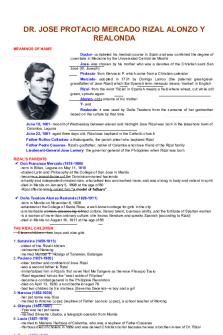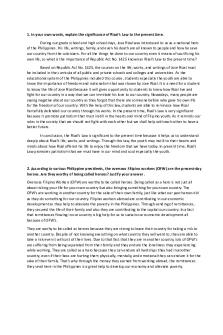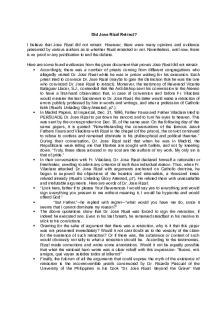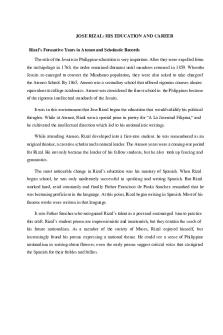Chapter 10 Jose Rizal and Philippine Nationalism Bayani and Kabayanihan PDF

| Title | Chapter 10 Jose Rizal and Philippine Nationalism Bayani and Kabayanihan |
|---|---|
| Course | Life and Works of Rizal |
| Institution | University of Rizal System |
| Pages | 16 |
| File Size | 335.7 KB |
| File Type | |
| Total Downloads | 76 |
| Total Views | 1,157 |
Summary
The Life and Works of Jose RizalBy: Dr. Imelda C. Nery & Paul John G. SionChapter 10: Jose Rizal and Philippine Nationalism: Bayani and KabayanihanLEARNING OBJECTIVES:At the end of the lesson, the students should be able to: Interpret views and opinions about bayani and kabayanihan in the contex...
Description
The Life and Works of Jose Rizal By: Dr. Imelda C. Nery & Paul John G. Sion
Chapter 10: Jose Rizal and Philippine Nationalism: Bayani and Kabayanihan LEARNING OBJECTIVES: At the end of the lesson, the students should be able to: 1. Interpret views and opinions about bayani and kabayanihan in the context of Philippine history and society. 2. Assess the concepts of bayani and kabayanihan in the context of Philippine society.
JOSE RIZAL AND PHILIPPINE NATIONALISM: BAYANI AND KABAYANIHAN What is the first word that comes to your mind when you see the picture below? Why do you say so? Explain your answer in not more than five (5) sentences.
______________________________________________________________________ ______________________________________________________________________ ______________________________________________________________________ ______________________________________________________________________ ______________________________________________________________________ ___________________
______________________________________________________________________ ______________________________________________________________________ ______________________________________________________________________ ______________________________________________________________________ ______________________________________________________________________ ______________________________________________________________________ ______________________________________________________________________ ____________________________
Rizal valued nationalism, patriotism and heroism (kabayanihan). Serving as a role model and inspiration to every Filipino, he has manifested versatility and flexibility while sustaining a strong sense of moral uprightness. Indeed, he is our national hero. But what exactly is the definition of the word, “hero”?
HERO vs. BAYANI In mythology, a hero is someone who possesses great courage, strength, and is favored by the gods. The Merriam-Webster Online Dictionary defines "hero" as "a mythological or legendary figure often of divine descent endowed with great strength or ability; an illustrious warrior; a person admired for achievements and noble qualities; one who shows great courage.” The Filipino counterpart, bayani, has a similar meaning but with some contextual distinctions. Bayani is someone who fights with his ‘bayan’ or community. The Vicassan's Dictionary (Santos, 1978) provides the following meanings for bayani:"... hero, patriot ("taong makabayan"), cooperative endeavor, mutual aid, a person who volunteers or offers free service or labor to a cooperative endeavor, to prevail, to be victorious, to prevail ("mamayani"), leading man in play (often referred to as the "bida"--
from the Spanish for life, "vida"--who is contrasted with the villain or "kontrabida" from the Spanish "contra vida", against life)” as cited in Ocampo, 2016. UP Diksiyonariyong Filipino (2001) gives three meanings for 'bayani': (1) a person of extraordinary courage or ability; (2) a person considered to possess extraordinary talents or someone who did something noble ("dakila"); and (3) a leading man in a play (Ocampo, 2016). The Vocabulario de la lengua Tagala by the Jesuits Juan de Noceda and Pedro de Sanlucar (1755 and1860) lists these meanings for bayani: "someone who is brave or valiant, someone who works towards a common task or cooperative endeavor ("bayanihan") ( as cited in Ocampo, 2016). History professor Ambeth Ocampo sees it significant that bayani comes a few words under bayan, which is also defined as: "the space between here and the sky." Bayan is also a town, municipality, pueblo, or nation, and can refer to people and citizens (mamamayan) who live in those communities, or those who originate or come from the same place (kababayan). Bayan (Ocampo, 2016) also refers to the day (araw) or a time of a day (malalim ang bayan) or even to the weather, good or bad (masamang bayan). Ocampo, thus, concludes that "hero" and bayani do not have the same meaning. Bayani is a richer word than hero because it may be rooted in bayan as place or in doing something great, not for oneself but for a greater good, for community or nation.
THE CHANGING FORMS AND DEFINITIONS OF BAYANI AND KABAYANIHAN Anchored on the definitions given by old dictionaries, mga bayani may historically (and profoundly) refer to those who contributed to the birth of a nation. In the early times, heroes are the warriors and generals who serve their cause with sword, distilling blood and tears; they are those, for the Filipinos, who served their cause with a pen, demonstrating that the pen is as mighty as the sword to redeem a people from their political slavery. However, the modern-day bayani may refer to someone who contributes to a nation in a global world. In modern definitions, a Hero is: someone who has distinguished courage and ability, someone who do good deeds for the greater good of others, and mostly works alone. One case in point is our Overseas Filipino Workers ( OFWs) — Filipinos who are working in foreign countries who basically travel abroad in pursuit of better employment to provide for the needs of their respective families in the Philippines. The OFWs’ sacrifices play a vital role in the progress of the Philippines’ economic status — by remitting their savings back to the country, they help the government in pulling up the economy through the overall dollar reserve. The money that they send provides the much-needed hard currency, saving the country from defaulting debt obligations. Aside from this, they also help stabilize the Philippine Peso in relation to peso-dollar
exchange, which in turn, contributes to the country’s Gross National Product (GNP) growth. Truly, when they work abroad, they are taking risks (pakikipagsapalaran) and in recognition of their sacrifices, they are named Bagong Bayani or “Modern-Day Heroes”, acknowledging their contributions every December as the Month of Overseas Filipino Workers. Many Filipino bayani have fought and died for the Philippines, some of which are Jose Rizal, Andres Bonifacio, Apolinario Mabini, and many more. They can be considered as traditional Bayani, someone who fought for the people of his community and for their greater good, and died in exchange. But in our modern world, does our country need a bayani who will sacrifice his/her life for the country? Without a doubt, the concept of bayani and kabayanihan have evolved through the years. To better understand this evolution, let us compare the notion of OFWs as modern-day heroes to the early definitions of bayani. Its etymology is explained in an online article entitled, “Ang Salitang Bayani sa Pilipinas” (n.d.). “Ang salitang “bayani” ay isang Austronesian na salita na dinala ng ating mga katutubo sa ating bayan. Ang mga bayani ay ang mga mandirigma kung saan sila ay nangunguna sa pagtatanggol ng pamayanan laban sa mga kinakaharap na mga kaaway at panganib. Ang ilan sa mga diribatibo ng salitang bayani ay bajani, majani, bagabnim, bahani. Sa kultura nating mga Pilipino, ang pagiging bayani ay nasusukat sa katapangan at sa bilang ng napapatay na kaaway. May iba’t-iba itong antas. Ang mga antas na ito ay kinikilala bilang: 1) Maniklad, ang pinakamababang uri ng bayani na nakapatay ng isa o dalawang kaaway, karaniwang siya ay nakasuot ng putong na pula at dilaw; 2) Hanagan naman kung tawagin ang nasa ikalawang antas, siya ay sumasailalim sa ritwal na kung saan ay dapat siyang sapian ni Tagbusawa, ang diyos ng pakikidigma at kainin ang atay at puso ng mga kaaway. Karaniwang nagsusuot ang mga ito ng pulang putong; 3) Kinaboan naman kung tawagin ang makakapatay ng dalawampu hanggang dalawampu’t pito at karaniwang nakasuot ng pulang pantalaon; 4) Luto naman kung tawagin ang makakapatay ng limampu hanggang 100 na kaaway at karaniwang nagsusuot ng pulang jacket; 5) Lunugum naman ang pinakapaborito ng diyos na si Tagbusaw dahil dito maipapakita niya ang kanyang katapangan sa pakikipagdigma kung saan napatay niya ang kanyang kaaway sa sarili nitong tahanan. Itim ang karaniwang suot ng mga ito. Father of New Philippine Historiography and Pantayong Pananaw (For-Us-FromUs Perspective) Proponent, Dr. Zeus A. Salazar gives a different definition of the term bayani. In fact, he believes that bayani is different from “heroes.” For him, “ang mga bayani ay mga taong naglalakbay at bumabalik sa bayan… ang mga bayani ay lumalaban ng may kooperasyon [samantalang] ang mga hero (western concept) ay lumalaban mag-isa… Ang bayani ay hindi kailangang mamatay upang maging bayani... Kailangan niya lang gumawa ng magagandang impluwensya at mga gawain sa bayan upang tawaging bayani (Ang Salitang Bayani sa Pilipinas, n.d.).
This definition gives us hope that anyone of us can be a bayani, too, in our respective communities. Thus, we should now realize that a modern bayani can be anyone who sacrifices even the littlest of things for the benefit of others. A good example for a modern bayani is Efren Peñaflorida, who sacrificed his time and effort just to teach out-of-school youths in a simple pushcart classroom. He may not have died for the country, but he responded to the needs of others – education. “Each person has a hidden hero within, you just have to look inside you and search it in your heart, and be the hero to the next one in need.” – Efren Peñaflorida Today, anyone can be a bayani. A bayani who can sacrifice the simplest of things like: time, effort, and knowledge for those who are in need. We do not need to die like our traditional heroes, rather, a simple act of kindness can be worth a lot to someone. So, how can you be a Bayani of your time?
WHY IS RIZAL OUR GREATEST HERO? In an article entitled, “Who Made Rizal Our Foremost National Hero and Why?,” the author, Esteban A. de Ocampo, denies the claim that Rizal is a made-to-order national hero manufactured by the Americans, mainly by Civil Governor William Howard Taft. Instead, he defended Rizal as the country’s foremost hero. This was done, allegedly, in the following manner: "And now, gentlemen, you must have a national hero". These were supposed to be the words addressed by Gov. Taft to Mssrs. Pardo de Tavera, Legarda and Luzurriaga, Filipino members of the Philippine Commission, of which Taft was the chairman. It was further reported that "in the subsequent discussion in which the rival merits of the revolutionary heroes (Marcelo H. del Pilar, Graciano Lopez Jaena, Gen. Antonio Luna, Emilio Jacinto were considered, the final choice—now universally acclaimed wise one was Rizal. And so history was made." De Ocampo’s justification is founded on the definition of the term “hero,” which he took from the Webster’s New International Dictionary of the English Language, that a hero is "a prominent or central personage taking admirable part in any remarkable action or event". Also, "a person of distinguished valor or enterprise in danger". And finally, he is a man "honored after death by public worship, because of exceptional service to mankind". Why is Rizal a hero, more correctly, our foremost national hero? It was said in the article that he is our greatest hero because he took an “admirable part” in the Propaganda Campaign from 1882-1896. His Noli Me Tangere (Berlin, 1887) contributed tremendously to the formation of Filipino nationality and was said to be far superior than those published by Pedro Paterno’s Ninay in Madrid in 1885; Marcelo H. del Pilar’s La
Soberania Monacal in Barcelona in 1889, Graciano Lopez Jaena’s Discursos y Articulos Varios, also in Barcelona in 1891; and Antonio Luna’s Impresiones in Madrid in 1893. This claim was evident in the comments that Rizal received from Antonio Ma. Regidor and Professor. Ferdinand Blumentritt. Regidor, a Filipino exile of 1872 in London, said that "the book was superior" and that if "don Quixote has made its author immortal because he exposed to the world the sufferings of Spain, your Noli Me Tangere will bring you equal glory…" Blumentritt, on the other hand, after reading Rizal’s Noli, wrote and congratulated its author, saying among other things: "Your work, as we Germans say, has been written w/ the blood of the heart... Your work has exceeded my hopes and I consider myself happy to have been honored by your friendship. Not only I, but also your country, may feel happy for having in you a patriotic and loyal son. If you continue so, you will be to your people one of those great men who will exercise a determinative influence over the progress of their spiritual life." While Rizal’s friends and admirers praised him and his Noli with justifiable pride, his enemies were equally loud and bitter in attacking and condemning the same. Perhaps no other work has, up to this day, aroused as much hostile and spiteful argument not only among our people but also among reactionary foreigners as the Noli of Rizal. In the Philippines alone, De Ocampo shared in his article that Rizal’s novel was attacked and condemned by a faculty committee of a Manila university (UST) and by the permanent censorship commission in 1887 because the committee found the book "heretical, impious, and scandalous to the religious order, and unpatriotic and subversive to the public order, libelous to the government of Spain and to its political policies in these islands", while the commission recommended that "the I mportation, reproduction, and circulation of this pernicious book in the islands be absolutely prohibited." Coming down to our time, during the congressional discussions and hearings on the Rizal (Noili-Fili) in 1956, the proponents and opponents of the bill also engaged themselves in a bitter and long drawn-out debate that finally resulted in the enactment of a compromise measure, now known as RA 1425. In the Spanish capital, attacks on Rizal’s Noli were also staged - Senator Vida, Deputy (and ex-general) Luis de Pando and Premier Praxedes Mateo Sagasta were among those who unjustly lambasted and criticized Rizal and his Noli in the two chambers of the Spanish Cortes in 1888 and 1889. But it was comforting to learn that 13 years later, Cong. Henry Allen Cooper of Wisconsin delivered a eulogy of Rizal and even recited the martyr’s Ultimo Pensamiento on the floor of the U. S. House of Representatives in order to prove the capacity of the Filipinos for self- government. He said in part: "It has been said that, if American institutions had done nothing else to furnish to the world the character of George Washington, that alone would entitle them to the respect of mankind. So Sir, I say to all those who denounces the Filipinos indiscriminately as barbarians and savages, without possibility of a civilized future, that this despised race proved itself entitled to their respect and to the respect of mankind when it furnished to the world the character of
Jose Rizal." The result of this appeal was the approval of what is popularly known as the Philippine Bill of 1902. The preceding paragraphs, De Ocampo claimed, have shown that by the Noli alone Rizal, among his contemporaries, had become the most prominent/ the central figure of the Propaganda Movement. Ask again, why did Rizal, become the greatest Filipino hero? De Ocampo further justifies that [no Filipino has yet been born who could equal or surpass Rizal as a "person of distinguished valor/enterprise in danger, fortitude in suffering."] Of these traits of our hero, let us see what a Filipino and an American biographer said: "What is most admirable in Rizal," wrote Rafael Palma, is his complete selfdenial, his complete abandonment of his personal interests to think only of those of his country. He could have been whatever he wished to be, considering his natural endowments; he could have earned considerable sums of money from his profession; he could have lived relatively rich, happy, prosperous, had he not dedicated himself to public matters. But in him, the voice of the species was stronger than the voice of personal progress or of private fortune, and he preferred to live far from his family and to sacrifice his personal affections for an ideal he had dreamed of. He heeded not his brother, not even his parents, beings whom he respected and venerated so much, in order to follow the road his conscience had traced for him. He did not have great means at his disposal to carry out his campaign, but that did not discouraged him; he contented himself w/ what he had. He suffered the rigors of the cold winter of Europe, he suffered hunger, privation, and misery; but when he raised his eyes to heaven and saw his ideal, his hope was reborn. He complained of his countrymen, he complained of some of those who had promised him help and did not help him, until at times, profoundly disillusioned, he wanted to renounce his campaign forever, giving up everything. But such moments are evanescent, he soon felt comforted and resumed the task of bearing the cross of his suffering." (8) Dr. Frank C. Laubach, an American biographer of Rizal, spoke of the hero’s courage in the following words: “His consuming life purpose was the secret of his moral courage. Physical courage, it is true, was one of his inherited traits. But that high courage to die loving his murderers, w/c he at last achieved--that cannot be inherited. It must be forged out in the fires of suffering and temptation. As we read through his life, we can see how the moral strength and fiber grew year by year as he faced new perils and was forced to make fearful decisions. It required courage to write his two great novels telling nothing that no other man has ventured to say before, standing almost alone against the powerful interests in the country and in Spain, and knowing full well that despotism would strike back. He had reached another loftier plateau of heroism when he wrote those letters to Hong Kong, "To be opened after my death", and sailed to the "trap" in Manila without any illusions. Then in his Dapitan exile when he was tempted to escape, and said "No", not once but hundreds of times for four long years, and when, on the way to Cuba, Pedro Roxas pleaded with him to step off the boat of Singapore upon British territory
and save his life, what an inner struggle it must have caused him to answer over and over again, "No, no, no!" When the sentence of death and the fateful morning of his execution brought the final test, he walked with perfect calm to the firing line as though by his own choice, the only heroic figure in that sordid scene." To the bigoted Spaniards in Spain and in the Philippines, Rizal was the most intelligent, most courageous, and most dangerous enemy of the reactionaries and the tyrants; therefore he should be shot publicly to serve as an example and a warning to those of his kind. This was the reason why Rizal, after a brief mock trial, was sentenced to death and made to face the firing squad at Bagumbayan Field, now Luneta, in the early morning of December 30, 1896. And for the last time, we repeat the question: Why is Rizal the greatest Filipino hero that ever lived? De Ocampo claims that "he is a man honored after death by public worship, because of exceptional service to mankind". It was said that even before his execution, Rizal was the already acclaimed by both Filipinos and foreigners as the “foremost leader of his people". From Barcelona, M. H. del Pilar wrote to the Great Malayan on March 10, 1889 and said: "Rizal no tiene aun derecho a morir: su nombre constituye la mas pura e immaculada bandera de aspirationes y Plaridel los suyos no son otra causa ma que immaculada unos voluntarios que militan bajo esa bandera." Fernando Acevedo, who called Rizal his distinguido amigo, compañero y paisano", wrote the letter from Zaragoza, Spain, on October 25, 1889 and said: "I see in you the model Filipino; your application to study and you talents have placed on a height w/c I revere and admire." The Bicolano Dr. Tomas Arejola wrote Rizal in Madrid on February 9, 1891, saying: "Your moral influence over us is indisputable." And Guillermo Puatu of Bulacan wrote this tribute to Rizal, saying: "Vd. a quien se le puede (llamar) con razon, cabeza tutelary de los Filipinos, aunque la comparacion parezca algo ridicula, porque posee la virtud la atraer consigo encona...
Similar Free PDFs

Birth-and-Genealogy JOSE RIZAL
- 6 Pages

Jose Rizal Life and Works
- 35 Pages

Jose Rizal
- 43 Pages

Life and works of Jose Rizal
- 2 Pages

Retraction of Jose Rizal
- 2 Pages

Jose Rizal Movie Review
- 5 Pages

jose rizal film review
- 3 Pages

Did Jose Rizal Retract
- 2 Pages
Popular Institutions
- Tinajero National High School - Annex
- Politeknik Caltex Riau
- Yokohama City University
- SGT University
- University of Al-Qadisiyah
- Divine Word College of Vigan
- Techniek College Rotterdam
- Universidade de Santiago
- Universiti Teknologi MARA Cawangan Johor Kampus Pasir Gudang
- Poltekkes Kemenkes Yogyakarta
- Baguio City National High School
- Colegio san marcos
- preparatoria uno
- Centro de Bachillerato Tecnológico Industrial y de Servicios No. 107
- Dalian Maritime University
- Quang Trung Secondary School
- Colegio Tecnológico en Informática
- Corporación Regional de Educación Superior
- Grupo CEDVA
- Dar Al Uloom University
- Centro de Estudios Preuniversitarios de la Universidad Nacional de Ingeniería
- 上智大学
- Aakash International School, Nuna Majara
- San Felipe Neri Catholic School
- Kang Chiao International School - New Taipei City
- Misamis Occidental National High School
- Institución Educativa Escuela Normal Juan Ladrilleros
- Kolehiyo ng Pantukan
- Batanes State College
- Instituto Continental
- Sekolah Menengah Kejuruan Kesehatan Kaltara (Tarakan)
- Colegio de La Inmaculada Concepcion - Cebu







